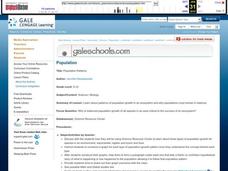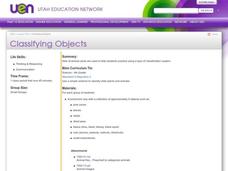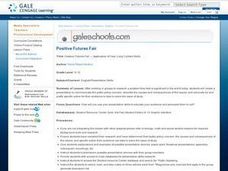Alabama Department of Archives and History
The Wrong Side of History: How One Group Justified Its Opposition on the Freedom Riders and Civil Rights for African Americans
Designed as a supplement to the study of the Freedom Riders, this resource uses primary sources to reveal the views of those who opposed the Freedom Riders. After careful study of the arguments presented by the members of the Montgomery...
Curated OER
Vaccines
High schoolers explore and explain the role of vaccines in infectious disease, They emphasize immunological principles and viral/bacterial infection processes. Students explore the three main vaccine types: DNA vaccines ("gene gun"),...
Curated OER
Water Awareness Portfolio Instructions
Learners participate in a water awareness portfolio. In this water conservation lesson students create a portfolio to help make them aware of current water conditions.
Curated OER
The Human Mind, Alcohol and the Brain
Students create a diagram showing the effects of alcohol on the brain and then create a lesson plan to teach this information to middle school students. They contact middle school teachers and make arrangements for students to actually...
Curated OER
Pandemics
Students demonstrate their knowledge of past, present and future pandemics. They create timeline for the spread of Influenza Pandemic of 1918. They discuss parallels between outbreaks of influenza and bird flu.
Curated OER
Health Care
Students analyze information and draw conclusions about the reality of human life expectancy; the battle between health care technology and our own internal time clocks. Students answer questions such as "Why does aging occur and can...
Curated OER
Investigative Case: The Nancy Creek Challenge
Students examine a case study of fish kill in Nancy Creek and identify the environmental conditions that favor life in a fresh water ecosystem. They work in small groups to assess the situation and gather resources from various places in...
Curated OER
Raptors: Senses and Influences
Young scholars compare the traits of humans to raptors. In this senses and beneficial traits lesson students create a newsletter and compare raptors to aircraft.
Curated OER
Human Body Systems: The Domino Effect
Students create a domino course to represent different human body systems. They discover the systems relationship to each other and their functions. They answer questions to complete the activity.
Curated OER
Population Patterns
Students study patterns of population growth in an ecosystem and why populations must remain in balance. They interpret basic population graphs and suggest scenarios about different population growth patterns in an ecosystem.
Curated OER
Genetics
High schoolers investigate public policy regarding genetic research and have formed an educated opinion on what they believe the government role should be.
Curated OER
Classifying Objects
Fourth graders work in small groups to sort and classify a variety of objects. They develop criteria for sorting and explain the characteristics they chose for classification. Groups record and share their classifications.
Curated OER
The Human Mind
Young scholars read and discuss twin studies to explore the debate of nature vs. nurture. They create a list of characteristics and then look for evidence of whether it is primarily a genetic or environmental characteristic. All of the...
Curated OER
Bioterrorism
Students research bioterrorism and then create two political cartoons, one that shows the viewpoint that bioterrorism is not a threat and one that shows the viewpoint that it is.
Curated OER
Ecology
Students learn what the Kyoto Protocol is and examine the decision of the United States to not sign the agreement.
Curated OER
Biotechnology
Young scholars introduced to the genre of science fiction and the theme of biotechnology within that genre.
Curated OER
The Value of Genetic History
Students research and assemble their own pedigrees using star patterns for each family member and coloring in various dominant traits. They arrange these patterns on long strips of paper making large, colorful family pedigrees.
Curated OER
Genetic Counseling
Students apply the principles of ethical decision making to actual cases. They appreciate that there is usually no one "right" decision. Students compare their conclusions to those of individuals who are in the field.
Curated OER
Science: Put Your Heart into Engineering
Students examine the heart and vascular system and the need for artificial valves. After explaining how heart valves function, they design their own heart valves for experimentation. They predict the speed of fluid flowing through...
Curated OER
Positive Futures Fair
Students, in groups, research an issue they feel is significant in today's world. They present and justify specific actions for the audience to take that would help to better the issue of public concern.
Curated OER
Global Awareness
High schoolers read about how scientists are arriving at current theories of human origin and migration through mitochondrial DNA analysis. They then piece together a map showing the data from mitochondrial DNA analysis to plot the...
Curated OER
The Value of Genetic History
Students explore their genetic background. They assemble their own pedigrees using star patterns for each family member and identifying various dominant traits. Predictions are made for future offspring.
Ohio State University
Osu General Plant Biology: Fungi
This is a summary article that explains what a fungus is and how it survives. There is a good section on the economic importance of fungi.
Nobel Media AB
The Nobel Prize: The Nobel Prize in Physiology or Medicine 1933
At this site from The Nobel Foundation you can read about Thomas Hunt Morgan, the scientist who won the Nobel Prize in Medicine "for his discoveries concerning the role played by the chromosome in heredity." This website is organized...

























